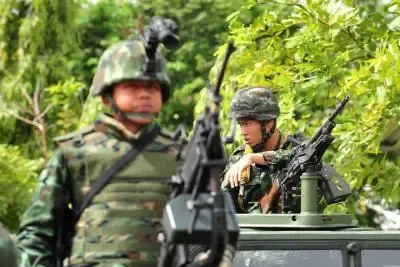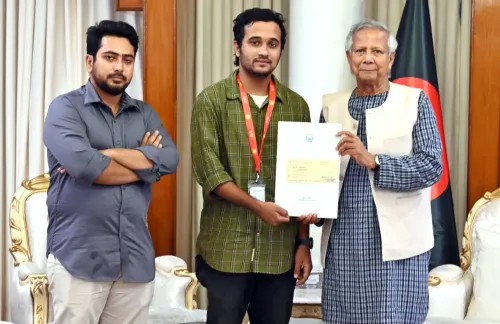Did Thailand's Soldiers Really Get Injured by Landmines?

Synopsis
Key Takeaways
- Three Thai soldiers were injured in a landmine explosion according to the Thai Army.
- Cambodia denies the allegations of having laid new landmines.
- The incident underscores ongoing tensions along the Thai-Cambodian border.
- Bilateral agreements were made to maintain troop levels without escalation.
- Both nations are encouraged to pursue peaceful resolutions.
Bangkok, Aug 10 (NationPress) The Thai Army reported that three soldiers were injured due to a landmine explosion while on a patrol along the Thai-Cambodian border. However, these claims have been strongly contested by Cambodia.
According to the Second Army Region of Thailand, the explosion took place at approximately 10:00 a.m. local time on Saturday as Thai troops were patrolling and installing barbed wire to enhance border security in Sisaket Province, as reported by Xinhua news agency.
Thai army spokesperson Winthai Suvaree stated that this incident is a clear indication of the ongoing and hidden use of weapons by the Cambodian side, which violates the Anti-Personnel Mine Ban Convention, also known as the Ottawa Convention.
"Such actions present a significant barrier to achieving ceasefire measures and resolving conflicts through peaceful negotiations and further substantiate that Cambodia has habitually initiated the use of weapons first," Winthai said in an official statement.
On Saturday evening, the Cambodian Mine Action and Victim Assistance Authority (CMAA) categorically denied the Thai claims that new mines were laid, resulting in the injuries to the three Thai soldiers.
"Cambodia’s stance is clear: We have neither laid nor will we lay new landmines," the CMAA stated in a press release.
"Currently, no official or transparent investigation has been conducted regarding the incident involving the injured Thai soldiers," the press release noted.
"In the absence of verified information, it is crucial for all parties to exercise caution in their public statements. Unfounded accusations not only jeopardize the cooperative spirit established under the ceasefire but also threaten to diminish trust at a critical time when constructive dialogue is essential," it further added.
The press release emphasized that Cambodia hopes the Thai side will adhere to the agreements made at the extraordinary meeting of the Cambodia-Thailand General Border Committee (GBC), particularly point two, which stipulates that both sides maintain their current troop positions without further movements, including patrols toward the opposite side.
On August 7, both Cambodia and Thailand reached an agreement on ceasefire details and signed a pact at a GBC extraordinary meeting held in Malaysia. They agreed to uphold current troop levels and refrain from increasing military presence along the border.









